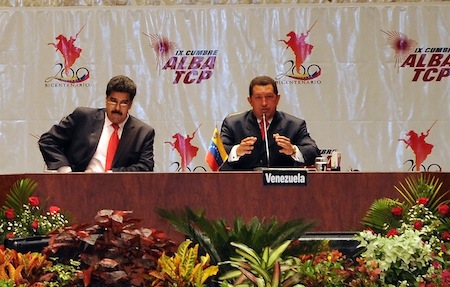Venezuelan president Hugo Chávez, only two months after winning reelection against his strongest opponent in 13 years in office, appears to have taken a turn for the worse in his ongoing struggle with cancer, has returned to Cuba for surgery. ![]()
Before leaving, however, he indicated his express preference for his successor — for the first time — in the event that his health declines terminally. That’s as close as any indication that Venezuelans have received from Chávez that he is battling terminal cancer, in a hasty address to the nation late Saturday night:
Unfortunately, comprehensive tests (performed in Cuba) found the presence, in the same area (previously) affected, of malignant (cancerous) cells. It has been decided that it is absolutely necessary and essential to undergo further surgery. This should happen in the coming days. Doctors even recommended performing the surgery yesterday (Friday) or this weekend at the latest.
Not surprisingly, Chávez anointed Nicolás Maduro (pictured above, left, with Chávez) as his favored successor, expressing openly what he had indicated implicitly in October when he elevated Maduro, formerly foreign minister, to become Venezuela’s new vice president.
Maduro, a former bus driver and trade unionist, has been part of Chávez’s ruling Partido Socialista Unido de Venezuela (PSUV, or United Socialist Party of Venezuela) since its foundation, and he was by Chávez’s side in 1998 when the PSUV first won power. He was a member of Venezuela’s parliament until 2006, serving as speaker from 2005 to 2006, when he was named as Chávez’s foreign minister. As such, he’s a fairly well-known figure to Venezuela’s key allies and opponents alike, including China, the United States and Cuba, although observers are cautiously optimistic he would be a more moderate leader, more in the mould of former Brazilian president Luiz Inácio Lula da Silva than Chávez.
Chávez is set to be inaugurated for his fourth term on January 10 — if he were to die during his third term, Maduro would take over as president until January 10. If Chávez dies after reelection, Diosdado Cabello, the speaker of the National Assembly, would take over temporarily while new elections are organized. Under Venezuelan law, a new presidential election would be required within 30 days of Chávez’s death or resignation during the first four years of his term (which is set to run for six years, through 2019). Chávez’s announcement on Saturday makes it very likely that, despite Cabello’s presidential ambitions, Maduro would likely lead the PSUV in any such presidential election in the near future.
Venezuelans return to the polls on December 16 to vote for regional governments, including in Miranda state, where Chávez’s one-time challenger Henrique Capriles is facing a strong challenge from Maduro’s predecessor as vice president, Elías Jaua.
Capriles won 45% of the vote nationally against Chávez in October as the leader of the opposition coalition, Mesa de la Unidad Democrática (MUD). If Capriles wins on Sunday in Miranda state, he will be well placed to compete in any future presidential election against Maduro.

One thought on “Chávez officially names Maduro as anointed successor”